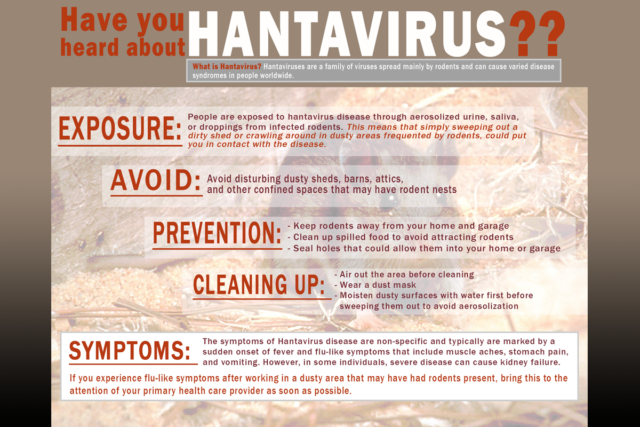 Public Health Command Europe
Public Health Command Europe
News Release
As summer approaches, your public health professionals at Public Health Command Europe would like to make everyone aware of a lesser known disease caused by hantavirus. Every year, several hantavirus cases are reported within Europe’s military community. With warmer weather, people tend to spend more time outdoors, go on nature walks, and possibly venture into their tool sheds to clean them out. Before you do, however, be sure to take some precautions and educate yourself on the symptoms, risks, and preventive measures to avoid hantavirus exposure.
People are exposed to hantavirus disease through droppings or dust contaminated by urine or saliva from infected rodents. Sweeping out a dirty shed or crawling around in dusty areas frequented by rodents is a common way that people come into contact with the disease. The good news is that hantavirus is not known to be carried by commonly-owned pet rodents, such as Guinea pigs, hamsters, or gerbils. Additionally, the most common hantavirus strain found in Europe, Puumala hantavirus, generally causes milder disease symptoms compared to the more severe hantavirus types that you may have read about in the news and are found in the United States. Between 80-95% of those exposed to the strain found in Europe do not get sick or develop symptoms. The symptoms of hantavirus disease are non-specific and typically are marked by a sudden onset of fever and flu-like symptoms that include muscle aches, stomach pain, and vomiting. However, in some individuals, severe disease can cause kidney failure.
 Your best protection against hantavirus is to avoid exposure to wild rodents and their excrement. Avoid disturbing dusty sheds, barns, attics, and other confined spaces that may have rodent nests. When cleaning out these areas, wear a dust mask and moisten dusty surfaces with 10% bleach, if possible, or water before sweeping them out to reduce the amount of dust put into the air. Make sure the liquid is applied gently and does not make dust circulate in the air. If possible, air out the area before entering if this will not expose people outside these areas. You may wish to wear a dust mask while cleaning for extra protection. After your cleaning activities are done, shower or wash your hands and face thoroughly with soap and water. Employ additional safety measures to reduce rodent access into your home and aforementioned areas by eliminating possible food sources, setting traps, sealing up holes or other access points, repairing screens, and ensuring the weather seals on doors (to include pet doors) are intact.
Your best protection against hantavirus is to avoid exposure to wild rodents and their excrement. Avoid disturbing dusty sheds, barns, attics, and other confined spaces that may have rodent nests. When cleaning out these areas, wear a dust mask and moisten dusty surfaces with 10% bleach, if possible, or water before sweeping them out to reduce the amount of dust put into the air. Make sure the liquid is applied gently and does not make dust circulate in the air. If possible, air out the area before entering if this will not expose people outside these areas. You may wish to wear a dust mask while cleaning for extra protection. After your cleaning activities are done, shower or wash your hands and face thoroughly with soap and water. Employ additional safety measures to reduce rodent access into your home and aforementioned areas by eliminating possible food sources, setting traps, sealing up holes or other access points, repairing screens, and ensuring the weather seals on doors (to include pet doors) are intact.
Safety precautions are also important when engaging in outdoor activities, such as hiking and gardening. Hikers are advised to stay on walking paths, keep food properly sealed, and stay away from rodents. Rodents do not show outward symptoms when they are infected, and the virus can remain infective in the environment for a long time. Gardeners should moisten the area they will be working to avoid aerosolizing the dust and practice good hand washing at breaks and when finished with their chores.
If you experience flu-like symptoms after working in a dusty area that may have had rodents present, bring this to the attention of your primary healthcare provider as soon as possible.
To find out more about hantavirus please visit: http://ecdc.europa.eu/en/healthtopics/hantavirus/Pages/index.aspx
